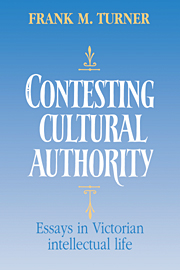Book contents
- Frontmatter
- Contents
- Preface
- I SHIFTING BOUNDARIES
- II SCIENCE AND THE WIDER CULTURE
- III MODERNS AND ANCIENTS
- 9 British politics and the demise of the Roman republic: 1700–1939
- 10 Ancient materialism and modern science: Lucretius among the Victorians
- 11 Virgil in Victorian classical contexts
- 12 The triumph of idealism in Victorian classical studies
- Index
12 - The triumph of idealism in Victorian classical studies
Published online by Cambridge University Press: 22 September 2009
- Frontmatter
- Contents
- Preface
- I SHIFTING BOUNDARIES
- II SCIENCE AND THE WIDER CULTURE
- III MODERNS AND ANCIENTS
- 9 British politics and the demise of the Roman republic: 1700–1939
- 10 Ancient materialism and modern science: Lucretius among the Victorians
- 11 Virgil in Victorian classical contexts
- 12 The triumph of idealism in Victorian classical studies
- Index
Summary
Few topics in nineteenth-century intellectual history have been so neglected as the story of idealism after the death of Hegel. In the work of most historians idealism becomes displaced by science and positivism on the one hand and Marxism on the other. Yet in point of fact, philosophical idealism of different varieties continued to permeate and even dominate numerous areas of thought from the 1840s through World War I not only in Great Britain but also on the European continent and in America. One need only peruse the pages of J. T. Merz's History of European thought in the nineteenth century (4 vols., 1896–1914) to begin to appreciate the vast idealist presence. Spokesmen for idealism held chairs in philosophy in virtually all major universities across the Western world, influenced political and social philosophy, blunted the impact of utilitarianism and scientific naturalism, and exercised influence over all schools of early and late century theology. There was no single idealist philosophy, but rather at the close of the century idealism represented an outlook that emphasized metaphysical questions in philosophy, historicist analysis of the past, the spiritual character of the world, the active powers of the human mind, intuitionism, subjective religiosity, the responsibility of individuals for undertaking moral choice and action, the relative or even absolute importance of communities and communal institutions over individual action or rights, and the shallowness of any mode of reductionist thought.
- Type
- Chapter
- Information
- Contesting Cultural AuthorityEssays in Victorian Intellectual Life, pp. 322 - 361Publisher: Cambridge University PressPrint publication year: 1993

